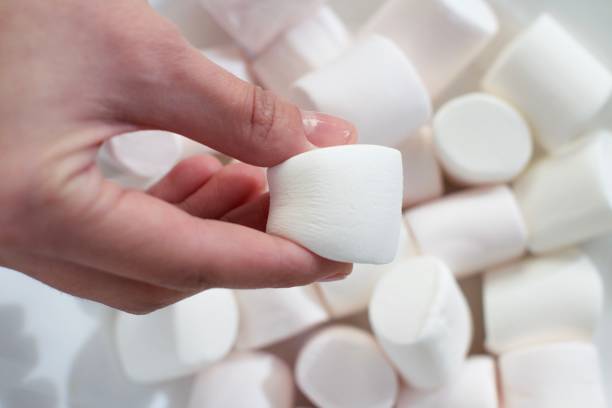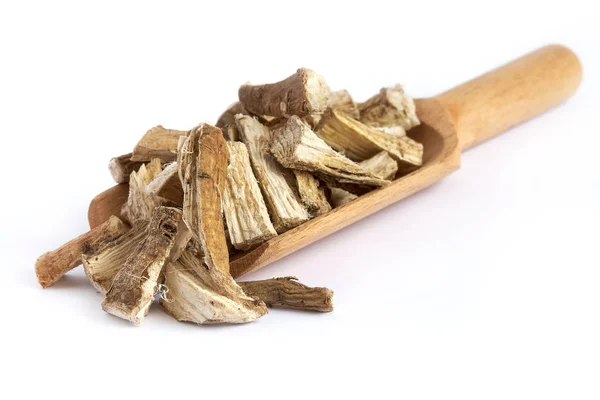Table of Contents
ToggleMost of the at-home remedies for sore throats are horrible. Gargling with salt water and eating honey are just two treatments that have been tried and failed. And if you’ve ever read any lifestyle blogs, you know that marshmallows are a common home remedy for sore throats. Indeed, these are the essentials for preparing s’mores, which become irresistible when doused in melted chocolate and roasted over an open fire.
What Do Marshmallows contain?
In a nutshell, marshmallows are made from sugar, corn syrup, gelatin, and air. The last word has been spoken. Making marshmallows involves first foaming a liquid sugar mixture with air and then stabilizing the froth with gelatin.
It’s safe to argue that gelatin is the essential ingredient in marshmallows since it acts as a type of scaffolding for the sugar and flavoring and gives marshmallows their trademark stretched, gooey texture. Gelatin is made from collagen, the main connective tissue protein in animals. Don’t get confused over the marshmallow ingredients and look at our blogs which cover if marshmallow contain dairy or are they dairy-free.
Collagen can best be described as a triple helix. One helix is inside another helix. Dissolving the gelatin in hot water is the first step in making marshmallows. Because heat partially unravels the helices in proteins, these strands tend to spread out in the water. The gelatin molecule’s connection zones rewind together in threes to form the helix of helices when the water begins to cool. Despite the gelatin’s best efforts, some stubbornly refuse to regain their original coil shape. Gelatin is commonly used in airy confections like marshmallows due to its elasticity, resulting from a balance between gelatin’s flexible and firm structural components.
Are Marshmallows Effective for Sore Throat? Maybe Yes! But.....

Marshmallows

Marshmallow Root
Don’t confuse marshmallow root, used for centuries in traditional medicine, with today’s confections.
Store-bought marshmallows, like those used in hot chocolate and s’mores, are made primarily of sugar, water, and gelatin and are whipped into a fluffy consistency. There is no evidence that any of these ingredients alleviate throat pain.
However, marshmallow root is a plant that has been shown to alleviate sore throat symptoms. Althea officinalis L. is the Latin synonym for “marshmallow root.” It thrives in the temperate regions of Europe, Asia, and elsewhere. It has a long history of therapeutic usage.
There was a time when marshmallows contain marshmallow root, but not anymore.
You Might Like: https://realgoodgummies.com/can-dogs-eat-marshmallows
Marshmallow Root for sore throat
Marshmallow root is most well-known for relieving coughs and sore throats; it is frequently included in all-natural remedies like cough syrup and lozenges. But does it function? According to certain animal studies and human experiments, the answer might be yes.
Researchers in Germany, where marshmallow has a long history of therapeutic usage, examined the efficacy of marshmallow root extract lozenges and syrup in treating dry coughing. They discovered that both approaches alleviated the cough and sore throat and did so rapidly (in most cases, within 10 minutes).
These results are supported by a recent review study that aimed to summarize the findings of numerous studies on the efficacy of marshmallows for cough. Marshmallow was effective as a cough suppressant and expectorant when used alone or in conjunction with other herbal treatments like ginger. The authors suggest that marshmallow root might help treat respiratory problems, including coughing and sore throats.
Further, marshmallow root may help soothe a child’s cough. Two studies suggest that marshmallow root-containing herbal combinations can lessen instances of coughing, waking up at night, and catching a cold.
- Take an antacid
Using drugs for acid reflux, including antacids, to ease the agony of a sore throat. You can try an over-the-counter antacid like Tums or Mylanta as the first line of defense.
- Let’s drink some herbal teas.
Eat more of the trendy new spice turmeric. For a sore throat because of its anti-inflammatory characteristics. Still, more research is needed to substantiate some of its benefits, such as its capacity to prevent cancer or brain disorders. Some individuals use it in a saltwater gargle, while others prefer to add a dash to their tea.
You Might Like: https://realgoodgummies.com/stuffed-puffs-marshmallows-review
Better and Effective Alternatives to Marshmallow
The worst can be a sore, scratchy throat. The mild irritation starts, and before you realize it, every agonizing swallow has you wincing. They may result from bacterial infections, viral infections, allergies, or even strained muscles. Marshmallows cure sore throat but in case you don’t have them, here are some alternatives.
To feel better quickly, use these science-backed solutions. Marshmallows cure sore throat but these might even help.
1. Sage and echinacea
You can compare sage to a hyper multitasker. The National Institutes of Health reports that it has been used as a herbal treatment in ancient Egypt, Greece, and Rome for a wide variety of conditions ever since.
Echinacea is also widely available in various pharmaceutical preparations such as extracts, tinctures, pills, capsules, and ointments. The combination of sage and echinacea has been shown to have beneficial effects.
2. Licorice root
Although licorice candies like Twizzlers and Red Vines are unlikely to alleviate a sore throat, some people have reported success with the shrub’s root. It would be great for a cup of tea, which is how we suggest you prepare it.
The heat isn’t just pleasant; it also helps. While this study was published a while ago, we still find it interesting: if patients gargled with licorice root before going under, it was just as helpful as ketamine in calming their throats following surgery.
These findings were reaffirmed in research conducted in 2013. In fact, half as many patients reported a sore throat after anesthesia if they gargled with licorice root before surgery.
3. Slippery Elm
Native Americans have long relied on the medicinal properties of elm tree bark. It is frequently prescribed for cough, diarrhea, or stomach pain patients. Consistently Reliable Information
In addition to helping with sore throats, it includes mucilage, a material that forms a gel when combined with water and can help soothe the throat. Take it as tea to soothe your throat.
If you frequently suffer from a sore throat, it’s a good idea to stock up on slippery elm by visiting a health food or convenience store.
You Might Like: https://realgoodgummies.com/best-vegan-marshmallows
Top 5 Easy Home Remedies for Sore throat for Quick Relief
1. Fluids, both hot and cold
Enjoy some hot tea or chicken soup. It’s beneficial for your body, mind, and spirit. You might also consume something cold, like ice water or a popsicle. It’s up to you to decide what tastes best and what helps your throat feel better.
Fluids flush out mucus, keep things moving, and ward against sinus infections. The back of your throat may feel less irritation at warm temperatures, which may help alleviate coughing. The best treatment depends on the individual, therefore try both hot and cold methods.
2. To gargle
Take half a teaspoon of salt in a glass of warm water or an equivalent amount of baking soda. Every three hours, gargle (but don’t swallow) the mixture for a natural sore throat cure.
Reducing swelling and discomfort in the throat, salt water can do just that. Baking soda can aid with acid reflux, which can cause irritation of the throat and mucus buildup.
3. Over-the-counter pain relievers and antihistamines
Assisting with or reducing throat pain, an antihistamine may do the trick. Pain in your glands and other regions of your neck can be alleviated with acetaminophen, ibuprofen, or naproxen.
Histamines are an immune system molecule that aids in the destruction of invading cells. However, “occasionally they go overboard, generating symptoms (such as congestion and post-nasal drip) that can make a sore throat seem worse,”. This reaction can be treated with antihistamines.
4. Steam
Do what you need to do and get in a hot shower. When things start to heat up, take a deep breath and feel the power of clearing your throat. Mucus is loosened and the sore throat is soothed by the moisture and warmth of steam.
5. A hot toddy
Hot whiskey mixed with honey and lemon juice is known as a “hot toddy,” and it’s often served hot. The addition of spices like cinnamon, nutmeg, and ginger is popular. One more thing: if you want to do this, you need to be of drinking age.
Things to avoid when you have a Sore throat
If you’re suffering from a sore throat, you should attempt to stay away from certain kinds of food.
Foods that are acidic
When your throat hurts, foods that are acidic, like citrus and tomatoes, as well as alcohol and dairy products, can be irritating to the throat.
In order to speed up the process of getting better, you should abstain from these items as well as any other food that makes your sore throat even worse.
Foods with a crunch.
If you have a sore throat, it is probably advisable to avoid eating crunchy items like potato chips, crackers, and other snacks until your sore throat has healed.
When you swallow, these meals could cause extra pain and irritation by giving you a sensation of sharpness in your throat.
Instead, when you are feeling ill, you should attempt to stick to foods that are easier to swallow, such as those that are softer.
I have had a sore throat for almost 3 days. Shall I look for a doctor?
The majority of the time, treating your sore throat at home will result in it getting better. If, on the other hand, you have a severe sore throat and a fever above 101 degrees for more than one to two days; if you have trouble sleeping because your throat is blocked by swollen tonsils or adenoids; or if a red rash occurs, it is time to see your doctor.
If you experience any of the signs and symptoms described above, it is possible that you are suffering from a bacterial infection. In such a scenario, your physician might suggest that you take an antibiotic to treat the infection you have.
A tonsillectomy is an option that may be suggested by a doctor to older patients who have suffered from recurrent bacterial throat infections in a relatively short amount of time.
Takeaway
Calling a doctor for a sore throat is only necessary for severe circumstances. This usually indicates other symptoms, including fever, rash, and sore throat.
You can get better without going to the doctor if you only try some home cures.
Get plenty of sleep and drink plenty of water to feel your best. You should contact a doctor if your sore throat doesn’t improve with over-the-counter or home treatments or if it worsens.
FAQ
1. Does marshmallow help with a sore throat?
While a store-bought marshmallow probably won’t help your sore throat, you can find remedies that use marshmallow root. Teas, supplements, and lozenges made from marshmallow root are famous for their ability to coat the throat and relieve pain.
2. Does eating marshmallows help a cough?
Marshmallow root has the potential to provide rapid relief for people with breathing problems. This is because marshmallow root promotes the development of a protective coating in the oral cavity and pharynx, reducing inflammation and irritation. Marshmallow root is effective in treating both wet and dry coughs.
3. Can you eat marshmallows when sick?
A 2019 study using marshmallow root found rapid relief from respiratory symptoms.
What does eating marshmallows help with?
Marshmallow is frequently applied topically and internally as a protective barrier. Its antibacterial and antitussive properties may come from its chemical composition. The flower and leaf of the plant known as Malva sylvestris (mallow) are frequently misidentified as marshmallows.
Dr. Susan Francis is a passionate medical professional with over 4.5 years of experience in the field. She received her medical degree from the University of Michigan and completed her residency at the Mayo Clinic.
In addition to her clinical work, Dr. Francis has a strong interest in medical writing and editing. She has edited numerous articles for medical journals and is a regular contributor to several healthcare publications.
Dr. Francis is committed to promoting accurate and accessible medical information to the public. In her free time, she enjoys staying up to date on the latest medical research and volunteering at local healthcare clinics.
- October 3, 2023
- October 3, 2023









